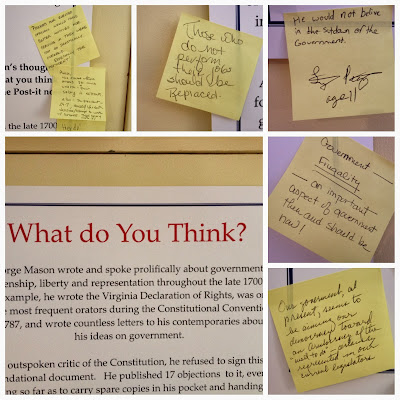Education Manager
George Mason wrote and spoke prolifically about government, citizenship, liberty, and representation throughout the late 1700s. For example, he wrote the Virginia Declaration of Rights, was one of the most frequent orators during the Constitutional Convention in 1787, and wrote countless letters to his contemporaries about his ideas on government.
An outspoken critic of the Constitution, he refused to sign the founding document. He published 17 objections to it, even going so far as to carry spare copies in his pocket, and handing them out to acquaintances.
So begins our newest exhibit at Gunston Hall, which is designed to encourage responses from visitors about the recent government shutdown. Given George Mason's comments about the way our government was being set up, and we wanted to know what visitors who walk through our door think about his commentary in the context of our current situation.
Since opening last Thursday, we have gotten wonderful responses from staff and visitors, including some younger visitors. They range from simple to complex, and as you might imagine, are emotionally invested in the situation at hand with the government. Most of them connect to things Mason said about government, or answer specific questions we developed, such as "Do you think the concerns expressed by Mason in the late 1700s remain valid today?"
In the Virginia Declaration of Rights, Mason stated "That no free Government, or the blessing of liberty, can be preserved to any people but by a firm adherence to justice, moderation, temperance, frugality, and virtue, and by frequent recurrence to fundamental principles." One of the responses to that statement was "Government
Other participants created a trail of discussion on the salaries of the legislature and whether or not they are being overpaid for their work. That is very interesting when one considers that in 1992, just a few years before the last government shutdown, the 27th amendment was ratified. The amendment, which prevents the implementation of Congressional salary changes until after the next election of representatives, was first proposed on September 25, 1789. No matter which side of the political spectrum our representatives fall upon, it seems they have had money issues from the very beginning; much as Mason feared.
In Mason's Objections to the Constitution, he was also worried about our representatives on a larger scale: "In the House of Representatives, there is not the Substance, but the Shadow only of Representation; which can never produce proper Information in the Legislature, or inspire Confidence in the People; the Laws will therefore be generally made by men little concern’d in, and unacquainted with their Effects and Consequences." One of our respondents agrees, "He certainly got that right as present circumstances show!"
There's only one question left. What do you think? Feel free to leave a comment, or drop by the museum and put up a sticky note. We'd love to hear what you have to say.
Also, stay tuned! This "Pop-up" exhibit represents the first of many small, temporary and interactive experiences we plan to produce for the purpose of connecting Mason's writings with contemporary issues.
Also, stay tuned! This "Pop-up" exhibit represents the first of many small, temporary and interactive experiences we plan to produce for the purpose of connecting Mason's writings with contemporary issues.


No comments:
Post a Comment